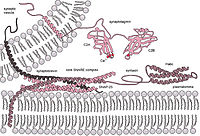
Photo from wikipedia
The downregulation of uncoupling protein-2 (UCP2) is associated with increased brain and kidney injury in stroke-prone spontaneously hypertensive rats (SHRSP) fed with a Japanese style hypersodic diet (JD). Systemic overexpression… Click to show full abstract
The downregulation of uncoupling protein-2 (UCP2) is associated with increased brain and kidney injury in stroke-prone spontaneously hypertensive rats (SHRSP) fed with a Japanese style hypersodic diet (JD). Systemic overexpression of UCP2 reduces organ damage in JD-fed SHRSP. We examined the effect of brain-specific UCP2 overexpression on blood pressure (BP), stroke occurrence and kidney damage in JD-fed SHRSP. Rats received a single i.c.v. injection of a lentiviral vector encoding UCP2 (LV-UCP2), or an empty vector. The brain delivery of LV-UCP2 significantly delayed the occurrence of stroke and kidney damage. The large reduction of proteinuria observed after LV-UCP2 injection was unexpected, because BP levels were unchanged. At the time of stroke, rats treated with LV-UCP2 still showed a large UCP2 upregulation in the striatum, associated with increases in OPA1 and FIS1 protein levels, and reductions in PGC1-α, SOD2, TNFα mRNA levels and NRF2 protein levels. This suggested UCP2 overexpression enhanced mitochondrial fusion and fission and reduced oxidative damage and inflammation in the striatum of JD-fed SHRSP rats. Our data suggest the existence of central mechanisms that may protect against hypertension-induced organ damage independently of BP, and strengthen the suitability of strategies aimed at enhancing UCP2 expression for the treatment of hypertensive damage.
Journal Title: International Journal of Molecular Sciences
Year Published: 2020
Link to full text (if available)
Share on Social Media: Sign Up to like & get
recommendations!